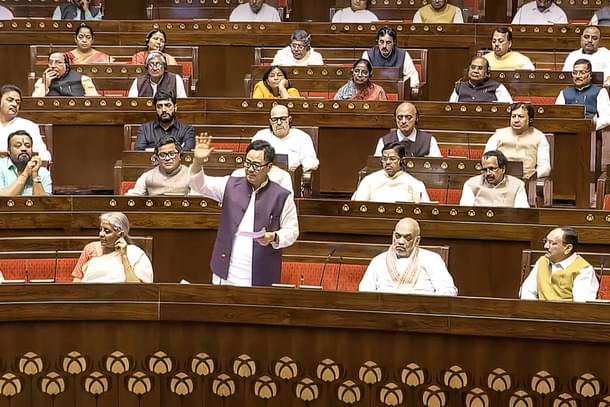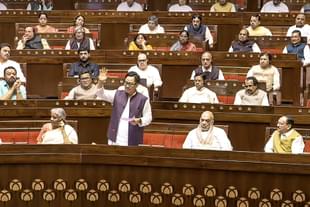Politics
Waqf Up Call: A Necessary End to Exploitation Disguised As Religious Endowment
Shubhendu Anand and Aayush Pandey
Apr 05, 2025, 10:41 AM | Updated 10:43 AM IST
Save & read from anywhere!
Bookmark stories for easy access on any device or the Swarajya app.


Imagine a vast expanse of land, larger than the entire state of Goa, entrusted with the purpose of serving the welfare of one of India’s most socio-economically disadvantaged communities.
Now imagine that this wealth, estimated at over ₹1.2 lakh crore and spread across 8.7 lakh properties, remains shrouded in opacity, mismanaged by self-serving elites, and encroached upon with impunity while millions of Indian Muslims struggle for access to education, healthcare, and economic mobility.
This is not a hypothetical scenario but the tragic reality of Waqf administration in India—a system that has long operated with minimal accountability under the archaic and deeply flawed Waqf Act of 1995.
The passage of the Waqf (Amendment) Bill, 2025, in both Houses of Parliament represents a decisive intervention in this long-neglected domain of governance and serves as a clarion call for institutional reform, transparency, and equitable access to community resources.
The debate surrounding Waqf reform must not be reduced to a matter of religious sentiment or identity politics, for at its core lies a fundamental question of governance: whether an institution managing such an enormous corpus of public-interest assets should remain insulated from modern regulatory norms, judicial scrutiny, and mechanisms of democratic accountability.
The Systemic Failures of the Waqf Act, 1995
The Waqf Act, 1995, born out of the Congress government’s longstanding policy of appeasement, has entrenched a system of opacity, inefficiency, and legal abuse that defies both constitutional principles and basic tenets of justice.
The most glaring flaw in the Act is its lack of transparency, particularly evident in Section 40, which grants Waqf Boards the unilateral authority to declare any property as waqf without any meaningful burden of proof or independent adjudication.
This provision has resulted in legal absurdities, where Waqf Boards have asserted claims over public and private properties with no historical or legal basis. The Tamil Nadu Waqf Board’s audacious assertion of ownership over a 1,500-year-old Hindu temple and the Uttar Pradesh Waqf Board’s claim over Chandrashekhar Azad Park, a public space of national significance, serve as egregious examples of the arbitrary and unchecked powers conferred upon these bodies.
Such instances highlight the absence of procedural safeguards and the arbitrary expansion of waqf assets at the cost of broader societal interests.
Beyond its structural opacity, the Act institutionalized a governance framework that has enabled elite capture and exclusionary decision-making.
By mandating that all members of Waqf Boards must be Muslim, the Act entrenched a self-perpetuating system of control by politically and economically influential groups within the community, effectively sidelining marginalized sects such as the Bohras, OBC, and Dalit Muslims.
This rigid structure has created an environment where corruption and misappropriation of waqf assets have flourished, as seen in scandals such as the Karnataka Wakf Board Land Scam, where thousands of acres of waqf land were illegally allocated to private interests at throwaway prices.
The absence of effective oversight mechanisms within the Act has allowed Waqf Boards to function with minimal accountability, treating waqf properties as their private domains rather than assets held in trust for public welfare.
The Waqf Act, 1995, fails to adhere to fundamental principles that ensure the orderly administration and protection of property rights.
The continued acceptance of oral waqf declarations, without the necessity of documentary evidence or registration in a centralized database, has led to an untenable legal landscape in which claims over property remain fluid, ambiguous, and vulnerable to manipulation.
The absence of a publicly accessible record of waqf properties has resulted in a situation where nearly fifty percent of these assets remain unaccounted for, leaving them susceptible to illegal transfers, encroachments, and disputes.
The doctrine of legal certainty, which requires that property rights be clearly defined and publicly recorded to prevent arbitrary expropriation, is systematically weakened by the Act’s failure to impose stringent registration and verification requirements.
In a legal framework that permits sweeping and retrospective claims over property without due process, the fundamental rights of individuals and institutions to security in their lawful ownership are continuously at risk.
The failure to direct waqf revenues towards tangible developmental outcomes such as education, healthcare, and housing for economically disadvantaged Muslims reveals the extent to which these endowments have deviated from their intended purpose.
The Waqf (Amendment) Bill, 2025: A Blueprint for Governance
The Waqf (Amendment) Bill, 2025, emerges as a legislative tour de force and marks a decisive break from the entrenched inefficiencies and institutionalized opacity that have long plagued the administration of waqf properties in India.
The most significant and far-reaching reform introduced by the new law is the removal of Section 40 of the Waqf Act, 1995, which previously allowed Waqf Boards to unilaterally declare any property as waqf without any evidentiary burden or judicial oversight.
This provision, which had been routinely abused to encroach upon public and private lands without due process, has been a major source of arbitrary property disputes and legal uncertainty.
Its removal restores the foundational principles of property law, ensuring that waqf claims must now withstand judicial scrutiny rather than being dictated by the unchecked authority of Waqf Boards.
The bill introduces a mandatory digitization framework that aims to create a comprehensive and publicly accessible database of waqf properties.
The bill advances a transformative agenda for gender equity by mandating the inclusion of women in the governance of waqf affairs.
The historical exclusion of women from Waqf Boards, despite their stake in community welfare, has reinforced deeply entrenched patriarchal structures that have denied them a role in decision-making processes concerning waqf resources.
This shift resonates with contemporary global trends, where countries such as Qatar have recognized the importance of gender-balanced endowment management in ensuring the effective and equitable distribution of waqf revenues.
The amendment categorically prohibits the creation of waqf properties on lands owned by tribal communities in areas designated under the Fifth and Sixth Schedules of the Constitution.
This provision corrects a historical anomaly wherein tribal lands, despite being subject to special protections, were still vulnerable to waqf claims.
The bill also addresses the rampant encroachment of properties under the guise of waqf declarations by restructuring the adjudicatory mechanisms governing waqf disputes.
By replacing the politically aligned survey commissioners with district magistrates and allowing appeals before the High Court, the amendment removes the excessive discretionary powers previously vested in Waqf Boards.
It will ensure that claims over property are subjected to rigorous legal scrutiny rather than unilateral administrative fiat.
Perhaps the most defining feature of the bill is its commitment to inclusivity by mandating the inclusion of non-Muslim members and OBC Muslim representatives within Waqf Boards.
By dismantling the exclusivist governance structure that has long facilitated elite capture, the bill ensures that waqf institutions remain accountable to the broader community they are meant to serve.
Congress and the Clergy
Among the critiques of the Waqf (Amendment) Bill, 2025, certain perspectives have sought to frame the reform as an unjustified encroachment on the autonomy of waqf institutions.
One such op-ed raises concerns about the bill’s implications for non-Muslim donations, the five-year conversion rule, and the perceived weakening of the regulatory authority of Waqf Boards.
While these objections present themselves as principled defenses of institutional continuity, they ultimately fail to engage with the deeper structural realities that have necessitated this legislative overhaul.
The most glaring omission in these arguments is their reluctance to acknowledge the systemic mismanagement that has plagued waqf administration for decades.
The failure to subject Waqf Boards to rigorous transparency mechanisms has facilitated widespread inefficiency, with reports indicating that nearly seven percent of waqf properties are under encroachment and that assets worth over ₹1.2 lakh crore remain underutilized or misappropriated.
Instead of engaging with these empirical realities, the defense of the status quo has largely centered on abstract legal concerns that do not reflect the lived experiences of marginalized Muslim communities, for whom waqf properties were originally intended to serve as a means of economic and social empowerment.
The Congress party’s legacy of deference to orthodoxy reveals a consistent pattern of prioritizing political expediency over substantive social reform.
From the 1986 reversal of the Shah Bano judgment—which was an overt capitulation to conservative Muslim leaders at the expense of women’s rights—to banning the import of Salman Rushdie’s novel The Satanic Verses and its long-standing defense of triple talaq, Congress has repeatedly demonstrated a willingness to align itself with regressive forces in the name of vote-bank politics.
This trend finds its latest manifestation in the party’s resistance to the Waqf (Amendment) Bill, 2025.
The Dawn of a New Era
By the time the Waqf (Amendment) Bill, 2025, receives the President’s assent, it will not merely be another legal reform but the writing of a new chapter in India’s governance history.
It will mark the end of an era in which religious endowments operated as opaque, unaccountable fiefdoms and the beginning of a future where law, not clerical authority, determines the fate of vast public assets.
By the time this bill becomes law, it will have not only amended an act but altered the trajectory of history.
It will stand as a marker of India’s unwillingness to allow medieval institutions to dictate the fate of communities in the twenty-first century.
The question before us is not whether waqf can be reformed but whether institutions that exist outside the principles of equity, accountability, and reason deserve to exist at all.
Institutions must evolve, or they must be erased. That is the true nature of history.
Shubhendu Anand is an advocate practicing at the Supreme Court of India. Aayush Pandey is an undergraduate law student at Gujarat National Law University, Gandhinagar. The views expressed are their own.





